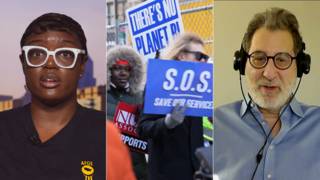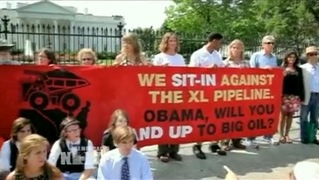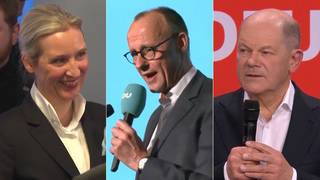
Related
Guests
- Lori Wallachdirector of Public Citizen’s Global Trade Watch and author of The Rise and Fall of Fast Track Trade Authority.
On Wednesday, TransCanada Corporation filed a lawsuit in U.S. federal court alleging President Obama’s rejection of the Keystone XL pipeline exceeded his power under the U.S. Constitution. TransCanada also filed legal action under the North American Free Trade Agreement, or NAFTA, claiming the pipeline permit denial was “arbitrary and unjustified.” It’s seeking $15 billion as part of its NAFTA claim. TransCanada’s lawsuit comes just days before President Obama’s final State of the Union address, where he’s anticipated to tout his controversial Trans-Pacific Partnership, or TPP, deal. The secretive trade pact between the United States and 11 Pacific Rim nations could govern up to 40 percent of the world’s economy. After TransCanada announced its lawsuit on Wednesday, the group Friends of the Earth released a statement saying, “This is why Friends of the Earth opposes the Trans-Pacific Partnership and other trade agreements, which allow companies and investors to challenge sovereign government decisions to protect public health and the environment.” For more, we’re joined by Lori Wallach, the director of Public Citizen’s Global Trade Watch.
Transcript
AMY GOODMAN: TransCanada Corporation has sued the U.S. government over its rejection of the Keystone XL pipeline. On Wednesday, it filed a lawsuit in U.S. federal court alleging President Obama’s rejection of the pipeline exceeded his power under the U.S. Constitution. TransCanada also filed legal action under NAFTA, the North American Free Trade Agreement, claiming the pipeline permit denial was, quote, “arbitrary and unjustified.” It’s seeking $15 billion as part of its NAFTA claim.
President Obama rejected the cross-border crude oil pipeline in November, after years of review and one of the most vocal grassroots campaigns this country has seen in decades. At the time, he said approving Keystone would undermine global efforts to stop climate change.
PRESIDENT BARACK OBAMA: America is now a global leader when it comes to taking serious action to fight climate change. And frankly, approving this project would have undercut that global leadership. And that’s the biggest risk we face: not acting. Today, we’re continuing to lead by example, because, ultimately, if we’re going to prevent large parts of this Earth from becoming not only inhospitable but uninhabitable in our lifetimes, we’re going to have to keep some fossil fuels in the ground, rather than burn them and release more dangerous pollution into the sky.
AMY GOODMAN: The Keystone XL pipeline would have sent 830,000 barrels of crude every day from Alberta’s oil sands to refineries on the U.S. Gulf Coast. TransCanada’s lawsuit comes just days before President Obama’s final State of the Union address, where he’s anticipated to tout his controversial Trans-Pacific Partnership, or TPP, deal. The secretive trade pact between the United States and 11 Pacific Rim nations could govern up to 40 percent of the world’s economy. After TransCanada announced its lawsuit Wednesday, the group Friends of the Earth released a statement saying, quote, “This is why Friends of the Earth opposes the Trans-Pacific Partnership and other trade agreements, which allow companies and investors to challenge sovereign government decisions to protect public health and the environment.”
Well, Democracy Now! invited TransCanada to join us on the show today, but the company declined, citing pending litigation. In a statement, it said, quote, “TransCanada has undertaken a careful evaluation of the Administration’s action and believe there has been a clear violation of NAFTA and the U.S. Constitution in these circumstances.”
Well, for more, we go to Washington, D.C., where we’re joined by Lori Wallach, director of Public Citizen’s Global Trade Watch, the author of The Rise and Fall of Fast Track Trade Authority.
Lori, welcome back to Democracy Now! Talk about your reaction to the TransCanada suit.
LORI WALLACH: Well, what it boils down to is a foreign corporation deciding that the U.S. taxpayers ought to give them $15 billion because they don’t like the outcome of our government decision that this pipeline was bad for our country and bad for the environment. And where they’re going to get this money extracted from us is an extrajudicial—not U.S. court, not U.S. law—forum: the investor-state tribunal allowed under NAFTA. And the U.S. has faced about a dozen of these attacks under NAFTA, all from Canada, but we have 50 agreements that have this outrageous system. Hardly any of those countries with those agreements actually have investors here. So, up to now, we haven’t lost one of these cases; however, the Trans-Pacific Partnership, overnight, if implemented, would double our liability. Right now, 50 agreements, about 9,000 companies are cross-registered from one of those countries that we have the agreement with operating in the U.S. to attack our laws in these tribunals. Overnight, the TPP would give 9,500 more companies—big multinationals from Japan, in banking, in manufacturing, mining firms from Australia—the right to do this. So this case, hopefully, is like the canary in the coal mine letting us know what we’d be getting into.
AMY GOODMAN: In May, President Obama delivered a speech at Nike in Beaverton, Oregon, where he defended the pending Trans-Pacific Partnership trade deal.
PRESIDENT BARACK OBAMA: Critics warn that parts of this deal would undermine American regulation, food safety, worker safety, even financial regulations. This—they’re making this stuff up. This is just not true. No trade agreement is going to force us to change our laws.
AMY GOODMAN: President Obama also said the TPP improves on NAFTA.
PRESIDENT BARACK OBAMA: When you ask folks, specifically, “What do you oppose about this trade deal?” they just say, ”NAFTA.” NAFTA was passed 20 years ago. That was a different agreement. And in fact, this agreement fixes some of what was wrong with NAFTA by making labor and environmental provisions actually enforceable. I was just getting out of law school when NAFTA got passed.
AMY GOODMAN: Lori Wallach, your response to President Obama? He was speaking at Nike headquarters.
LORI WALLACH: Well, first of all, the making stuff up comment is going to have to get shelved, because not only is this attack by TransCanada on our domestic, democratic government decision not to have a pipeline the exact kind of case he said couldn’t possibly happen—well, it just did, $15 billion being demanded by a—from a tribunal of three private sector attorneys, because this investor-state system, it’s not judges. There are no conflict-of-interest or impartiality rules. These are folks who rotate between one day suing a government for a corporation and the next day being the judge. And they all hear cases amongst themselves. They call themselves “the club.” And there’s no outside appeal, and there’s no limit on how much money they can order a government to pay. And if a government doesn’t pay, by the way, the company has the right to seize government assets—seize government assets—to extract our tax dollars. So, number one, this case is exactly the kind of case President Obama said folks were making things up when they were worried about this. Well, now it’s happened.
But this follows one month after the U.S. Congress, because the WTO threatened billions in trade sanctions, gutted another consumer law. Hate to tell folks, if they didn’t notice in the grocery store, but those customer meat—the country-of-origin labels we all use to figure out where our meat comes from, the WTO said we couldn’t have those anymore. And so, Congress, at the face of these sanctions, said, “Oh, better get rid of that law.” So, two examples, live and real, compared to what President Obama promised.
But more broadly about the TPP, here’s the thing folks need to know. The actual language that TransCanada is using in this case, because they filed a brief, is the same language that, word for word, is replicated in TPP. So there are bells and whistles that have been changed between the investor-state language in NAFTA and TPP. In many ways, actually, TPP expands investor-state. It allows more kinds of challenges. Hell, it even allows challenges of government contracts for foreign companies’ concessions on natural resources in foreign land. That was not in NAFTA. However, the actual claims being made by TransCanada, that language is word for word in the TPP. And you can see the analysis of that on our website, TradeWatch.org. You can look at the text now and use our analysis as basically a guided tour.
AMY GOODMAN: Lori, can you explain why they’re asking $15 billion?
LORI WALLACH: So, this is a question a lot of folks asked me yesterday: “Well, wait a minute, this is supposed to”—everyone who’s read the newspaper. “This is a $3 billion pipeline. How the heck can they be asking for $15 billion from us taxpayers?” And the answer is, under the outrageous investor-state system, not only can a foreign corporation get all these special rights—go around our courts, go around our laws and demand compensation—but they don’t just get money for what they’ve spent on a project, they get to get compensated for expected future profits. Yep, they are calculating—and the brief goes through this—what they think they would have made in the future for the lifetime of the pipeline had it been allowed. And that’s what we taxpayers are supposed to give them, because we had a democratic decision of our government that their commercial project wasn’t in the national interest. That’s the $15 billion.
AMY GOODMAN: Lori, can you talk about how trade rules have affected how countries can deal with climate change? Like in, what, 2014, the U.S. launched a WTO challenge against India’s solar incentives.
LORI WALLACH: So, there’s been really terrific work done on this by Sierra Club, NRDC, 350.org. If you go to their websites, for instance, Sierra Club has a terrific report that goes systematically through all the ways that our trade rules have undermined the efforts both to counter climate chaos, but also some of the adaptations, the efficiencies in energy policy we’d like to take on. And the overarching sum of it is, there are three problems.
One problem is, once we have a trade agreement with a country, we’re no longer allowed to stop exports of, for instance, liquid natural gas. It’s just deemed mandatory that we continue to send out energy. So, to the extent part of the answer to the climate disaster is we need to keep some carbon-based fuels not being processed and shipped around, we lose the right, as a policy, to do that. It’s considered zero quota. We’re not allowed to limit trade.
Number two, the nontrade regulatory limits in all these trade agreements—because, you know, the rule is, every country has to change its domestic laws to meet all these nontrade rules. TPP has got 30 chapters. Only six have to do with trade. There’s a whole chapter on services, and it covers energy services. For instance, it does not allow you, in your policies, to discriminate between how you regulate, say, fossil fuels versus wind or solar. If it’s fuel, it’s fuel. And there’s a whole set of specific constraints around those kind of energy and conservation policies.
And then, the third thing it does is it limits the kind of procurement policies you can have. So, typically, the government is the cutting edge in using our tax dollars when they’re buying things for government to set up a market. So, you know, the car efficiency standards, fuel efficiency standards, we all know there’s CAFE standards in our cars when we buy them. That started as a government program for the government fleet, so that the companies had a market to try and make efficient cars. So, right now, for instance, we have something called renewable portfolio standards, where when the government buys energy, a certain percentage has to be from renewable sources. Those kind of conditionalities are limited in the procurement chapter of an agreement like the TPP. So, basically, it hits, for the fuel industry—that’s why they love it—on all grounds, in handcuffing governments with their policy options.












Media Options